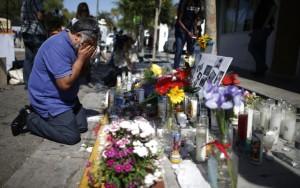
A memorial for the victims of the recent shooting in Isla Vista, Calif.
In this exact moment, dozens of UC Santa Barbara students are mourning the shooting deaths of six of their classmates; thousands of Bosnians, Croatians and Serbians are displaced from their homes and missing family or friends because of deadly flooding; and hundreds of fallen miners are being laid to rest after the worst mining disaster in Turkey’s history.
In a world of ceaseless tragedy, hardship and struggle, how do we decide what to care about and how to show our compassion?
We have a tendency to overcomplicate the notion of compassion. We either dedicate all of our time to a cause – start a nonprofit, an organization or protest in its name, or we ignore it. Go big or go home, right?
We care about the topics that resonate with us, or the topics that are trending. From Kony 2012 to the Bring Back Our Girls movement — both of which are necessary and powerful causes — our level of compassion as a nation increases when topics are endorsed by celebrities or well-known politicians.
And how many times have you looked into something because, “It could happen here; we should learn from it,” “The job or the program to which I’m applying will expect me to know about it,” “My friends, peers, or coworkers are talking about it” or, “It’s my hometown, state or country, I’ve been there or I speak that language?”
We seldom lend our efforts to a random cause without regard to how many people are hashtagging it, writing news stories about it or talking about it.
It’s almost as if compassion were a form of currency — meant to be spent carefully.
But what if we were to think of compassion as a kind of communal gift, instead? What if we were to rethink the why and the how? It’s time to care more and care more purely. Random, simple compassion, in this sense, is important.
My family, for example, lost everything we had and almost everyone we knew in the gruesome Balkan war of the 1990s and had to start from nothing in a foreign country. Although money, jobs and learning English were immensely helpful to our new start, those things were not what made it possible for us to thrive here.
What meant the most to us, by far, was the compassion of our peers. It was compassion in the form of outrage: those who refused to tolerate genocide, to accept the “explanations” for it or to remove themselves from the chaos until things got better.
It was compassion in the form of generosity: those who took the time and effort to send clothes, food and medicine to refugees who had lost everything.
It was compassion in the form of common sense: those who said, “This is the 20th century, and these are things that can no longer happen.”
While I can’t speak for every victim of tragedy or anyone who has been through tough times, a simple hug or a pat on the back can mean the world. Maybe you’ve never walked in my shoes or been through my struggles — maybe you have been through what I have — but you understand what it’s like to feel down on your luck or like things are falling apart. You open up your heart to me, because you are a loving human being.
The truth is that it’s hard to cope with tragedy, no matter how far removed from us. Humans are, by nature, not emotionally equipped to hear gruesome details of wars, crimes against humanity and constant violence. It depresses us, traumatizes us and simply makes us unhappy. That’s natural, and no one expects you to change that.
We can help the world in one concrete, feasible way: Care more and care more purely. Let us read news stories not only for the purpose of being well-informed, but also for the purpose of showing respect and understanding for those who suffer. A headline that takes us but a few seconds to absorb encompasses a tragedy that can wreak years of havoc and even lifelong trauma to its victims.
Compassion does not require starting a nonprofit, making headlines or donating millions. A hug, a pat on the back, a listening ear — the things that we deem “the little things” — can mean the world to any one person. After all, isn’t that what being a good person is all about?
 Melina Delkic is a rising sophomore in the College. Year One-And-A-Half appears every Wednesday at thehoya.com.
Melina Delkic is a rising sophomore in the College. Year One-And-A-Half appears every Wednesday at thehoya.com.














